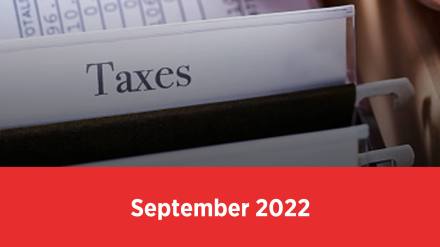Monthly requirements
If your church or organization reported withheld taxes of $50,000 or less during the most recent lookback period (for 2022, the lookback period is July 1, 2020, through June 30, 2021), then withheld payroll taxes are deposited monthly. Monthly deposits are due by the 15th day of the following month.
Note, however, that if withheld taxes are less than $2,500 at the end of any calendar quarter (March 31, June 30, September 30, or December 31), the church need not deposit the taxes.
Instead, it can pay the total withheld taxes directly to the IRS with its quarterly Form 941. Withheld taxes include federal income taxes withheld from employee wages, the employee’s share of Social Security and Medicare taxes, and the employer’s share of Social Security and Medicare taxes.
Semiweekly requirements
If your church or organization reported withheld taxes of more than $50,000 during the most recent lookback period (for 2022, the lookback period is July 1, 2020, through June 30, 2021), then the withheld payroll taxes are deposited semiweekly.
This means that for paydays falling on Wednesday, Thursday, or Friday, the payroll taxes must be deposited on or by the following Wednesday. For all other paydays, the payroll taxes must be deposited on the Friday following the payday.
Note further that large employers having withheld taxes of $100,000 or more at the end of any day must deposit the taxes by the next banking day. The deposit days are based on the timing of the employer’s payroll. Withheld taxes include federal income taxes withheld from employee wages, the employee’s share of Social Security and Medicare taxes, and the employer’s share of Social Security and Medicare taxes.
September 15, 2022: Quarterly estimated tax payments for certain employees and churches
Filing for certain ministers and self-employed workers
Ministers (who have not elected voluntary withholding) and self-employed workers must file their third quarterly estimated federal tax payment for 2022 by this date. A similar rule applies in many states to payments of estimated state taxes.
Nonminister employees of churches that filed a timely Form 8274 (waiving the church’s obligation to withhold and pay FICA taxes) are treated as self-employed for Social Security, and as a result are subject to the estimated tax deadlines with respect to their self-employment (Social Security) taxes unless they ask their employing church to withhold an additional amount of income taxes from each paycheck that will be sufficient to cover self-employment taxes. Use a new Form W-4 to make this request (the additional withholding is reported on line 4(c)).
Payments for unrelated business income tax liability
A church must make quarterly estimated tax payments if it expects an unrelated business income tax liability for the year to be $500 or more. Use IRS Form 990-W to figure your estimated taxes. Quarterly estimated tax payments of one-fourth of the total tax liability are due by April 18 (April 19 if you live in Maine or Massachusetts), June 15, September 15, and December 15, 2022, for churches on a calendar-year basis. Deposit quarterly tax payments electronically using the Electronic Federal Tax Payment System (EFTPS).


